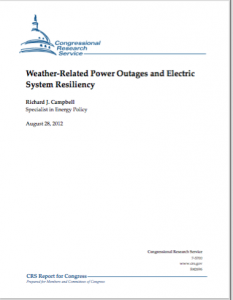Full Title: Weather-Related Power Outages and Electric System Resiliency
Author(s): Richard J. Campbell
Publisher(s): Congressional Research Service (CRS)
Publication Date: August 1, 2012
Full Text: Download Resource
Description (excerpt):
High winds, especially when combined with precipitation from seasonal storms, can cause damage to electricity utility systems, resulting in service interruptions to large numbers of electricity customers. While most such power outages are caused by damage from trees and tree limbs falling on local electricity distribution lines and poles, major power outages tend to be caused by damage to electricity transmission lines which carry bulk power long distances. Depending on the severity of the storm and resulting impairment, power outages can last a few hours or extend to periods of several days, and have real economic effects. Power outages can impact businesses (primarily through lost orders and damage to perishable goods and inventories), and manufacturers (mainly through downtime and lost production, or equipment damage). Data from various studies lead to cost estimates from storm-related outages to the U.S. economy at between $20 billion and $55 billion annually. Data also suggest the trend of outages from weather-related events is increasing.
Suggested solutions for reducing impacts from weather-related outages include improved tree- trimming schedules to keep rights-of-way clear, placing distribution and some transmission lines underground, implementing Smart Grid improvements to enhance power system operations and control, inclusion of more distributed generation, and changing utility maintenance practices and metrics to focus on power system reliability. However, most of these potential solutions come with high costs which must be balanced against the perceived benefits.
